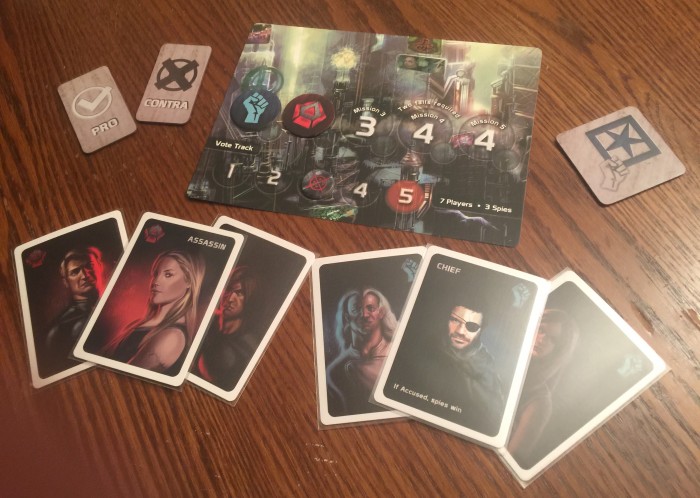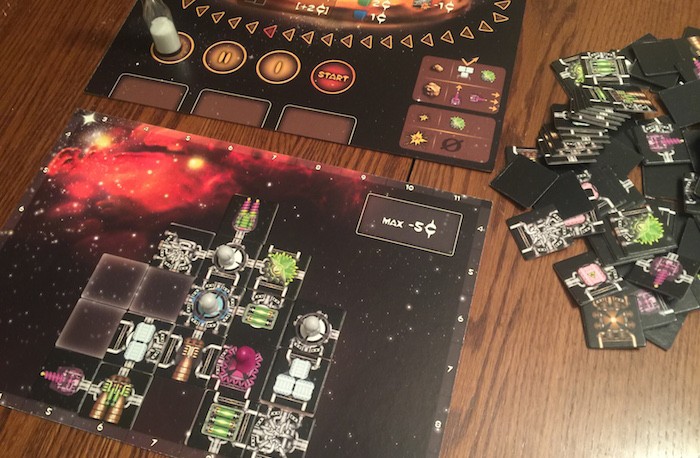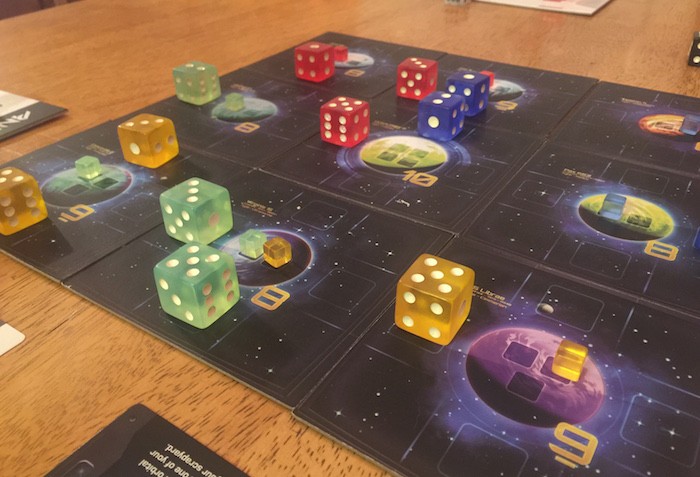More 'Star Wars' Board Games Every Fan Should Play, Episode II [Cardboard Cinema]
Welcome back to Cardboard Cinema, the series where we explore the fine line between movies and tabletop gaming.
A few days ago, we took a plunge into the world of officially licensed Star Wars board games, taking look at X-Wing, Star Wars: Armada, and Star Wars: Imperial Assault. Each of those games reflect a different corner of this classic universe, putting players in control of tiny space fighters, hulking Star Destroyers, and armies of Stormtroopers. They envelop players in the iconography of this beloved series, bringing the series to life right in front of them.
Today's games have none of that. There are no Skywalkers or TIE Fighters or Jedi Knights. But there are, well, just about everything else. These are science fiction games whose concepts, ideas, and themes should appeal to Star Wars fans of all stripes. Have you ever wanted to simulate being a member of a rebel group fighting an evil empire? Have you ever wanted to captain an old ship that keeps on failing in the face of danger? How about participating in a full-blown space conflict, but wrapping up in about 45 minutes? This batch of games is for you.
The Resistance
The science fiction world of The Resistance is a few sub-genres away from the space opera of Star Wars. It hews closer to Blade Runner or The Hunger Games – a rainy dystopia dominated by a cruel government that does not have the well-being of the citizenry on its mind. However, this easy-to-learn party game captures one angle that is under-explored in the Star Wars movies: the terror and paranoia that accompanies being the member of a rebellion.
The Resistance is simple but not simplistic, only gaining depth as the players around the table learn the ropes. Like its close relatives Mafia and Werewolf, you can teach an attentive group how to play in just a few minutes. It goes something like this: the players are members of a resistance group hoping to topple the evil empire and if they succeed on three out of five missions, they are victorious. However, a few members of the team are spies, working to undermine their operation and sabotage the missions. The spies know one another's identities, but the resistance members don't know who they are. As leadership changes hands and votes are called to determine each and every decision, distrust swells in the ranks and soon fingers are being pointed, voices are being raised, and chaos reigns. No game teaches you which of your friends is talented at lying to your face quite like The Resistance.
This is a game of discussion and deduction, of negotiation and bluffing. The cards and tokens are really just a social lubricant. It's impossible to play this game and not get into the spirit of the thing... unless your whole goal is to be the "quiet one," a tactic that could make you look totally guilty. Or innocent. Who knows? It could change from game to game.
There are no dice rolls in The Resistance. Luck begins and ends at the start of the game, when you are either dealt a loyal card or a spy card. From there, the fate of the group is in your hands. The responsibility placed on the shoulders of each player weighs a ton. Two tons if you're the group leader, charged with assembling a team of loyal soldiers and knowing that at least a few of them plan to screw the whole thing over. The same agonies applies to the spy – you are outnumbered and you must be proactive in your bald-faced lying to win. It's the best kind of stress.
This game shows you what you don't get to see in the movies. These are the intense discussions that occur before the mission. This is the rebel leadership realizing that something is wrong, that they're about to walk into a trap. The fireworks that explode during The Resistance feel deeply personal and human. Your decisions feel like they matter. The fate of the mission, of your movement, is in your hands.
Play this one with a beer or two and then add the special character roles once everyone knows the game. Once you've played with the special character card who knows the identity of the spies but cannot be identified by the traitors lest he instantly lose the game for his team (whew!), you'll never go back.
Galaxy Trucker
The Millennium Falcon may be the second most famous spaceship in popular culture (Enterprise NCC-1701 with the photo finish!), but let's not forget Luke Skywalker's disgusted reaction to the ship when he first spies it in that Mos Eisley hangar. And let's not forget Han Solo's irritated defensiveness at his ride being insulted. Hell, while we're not forgetting things, how about the second act of The Empire Strikes Back, wherein the Falcon spends the bulk of its time in the movie breaking down and failing at every important moment?
If being the owner and operator of a piece-of-junk spacecraft that only a captain could love is a dream of yours, than Galaxy Trucker is your game. Here is an experience that asks you to be a slightly lamer form of Han Solo. You and only you will love your ship, especially when everyone else at the table is laughing at you because it just got broken in half by an asteroid.
You will love your ship because you built it from scratch. Designed by the mad genius Vlaada Chvatil, Galaxy Trucker gives everyone a personal board covered with empty squares and access to the massive pile of tokens in the center of the table. A timer is turned over and the race begins as everyone rummages through the "junkyard," trying to find crew compartments, shield generators, storage containers, lasers, engines and everything else you could possibly want in your spaceship. When the timer is done, it remains where it is... until someone at the table makes the conscious choice to turn it over again and move it down a track. When it reaches the end of the track, all construction must immediately cease. The hilarious cruelty of Galaxy Trucker begins right here as the length of the shipbuilding phase is entirely controlled by the person who feels the most confident. They get to speed time up, laughing as the rest of the table struggles and yells and curses their name.
This first phase is the meat of the game and there is nothing else quite like it in the entire tabletop world. There are no turns and everyone plays in real time, desperately searching for the part that they need to make their crappy, literally assembled-from-spare-parts hunk of junk fly. It's tricky because connectors have to line up perfectly, keeping you from just slapping any 'ol part on wherever you want it. You build your ship in constant chaos, reverse engineering a puzzle. Often times, you will realize too late that you only have one engine or not enough energy rooms to power your lasers. Then everyone else gets to laugh at you.
And that's the number one appeal of Galaxy Trucker – it's hilarious. Even when your ship is a miserable, embarrassing failure, everyone around you is having a blast. You sometimes get the last word, as your opponents' seemingly superior ships often fail when asked to actually perform.
That's the second half of the game. Once ships are assembled, the players are subjected to a series of random encounters drawn from a deck of cards. Some cards are totally peaceful, allowing everyone to trade goods or find new crewmates. Others are hostile, subjecting players' ships to asteroids and space pirates and war zones filled with laser fire. This is where even the most perfectly built ships often crumble into pieces. Seriously. There is nothing that will get a group laughing quite like someone watching their ship getting torn apart and being forced to choose which half of their vessel they will keep.
The garish production design of Galaxy Trucker may turn off some. The rules, which are just complex enough to seem initially daunting, may scare away others. Those that remain, those that want an interactive puzzle that simulates your hopes and dreams being constructed and then torn apart by space smugglers, will find one of the best board games ever made. After all, being Han Solo isn't about being suave and cool – it's about being suave and cool while your ship literally falls apart around you.
Quantum
There are almost too many space opera games to recommend. How do you choose between the grandiose absurdity of Twilight Imperium, the economic detail of Eclipse, and the singular, deeply personal adventures of Xia: Legends of a Drift System? Plenty of games offer the scope of a Star Wars story, recreating interstellar war, intrigue, and adventure on a grand scale. But plenty of those games also cost a great deal of money, demand an entire day to play, and require you to slog through a thick rule book. Even when they're great games and great experiences, they can be a serious pain in the butt.
Enter Quantum. It's reasonably priced. It's easy to teach and accessible to new gamers. Its rule book is a svelte 16 pages. It plays in a about an hour. Most importantly, it's good. Really good. And it manages to do all of this while reinventing the way we use dice in a board game.
On paper, this is a board game about rival civilizations battling across the cosmos to build colonies on various planets. The first player to place all five of their cubes on different planets wins. What makes it special is the ships, which aren't ships at all. They're chunky, colorful six-sided dice and they're wonderful.
After the detailed spaceships of X-Wing and Star Wars: Armada, a game of galactic conquest and exploration that uses dice in place of ship models may seem, well, let's be honest here, a bit of letdown at first. But you forget that you're shuffling dice around the galaxy about ten minutes into your first game. The dice, in addition to just looking great against the dark cardboard of the galaxy, tell you everything you need to know. In short: a ship can move as many spaces as printed on the die, but the same number also represents its strength and smaller numbers are more powerful in combat. On top of that, each individual number has a unique ability, like 3s being able to teleport and 2s being able to carry other ships with them as they move. After a round or two, you no longer have to consult the rule book to get the lay of the land or know what is happening on the board. You take a quick glance over the dice, see the numbers in play, and you instantly know everything you need to know. Being able to quickly assess any given situation in Quantum becomes vitally important and the game makes it easy.
Although the game rewards aggressive play and the benefits from rampaging around the galaxy always outweigh turtling in a corner, Quantum is shockingly fair. It is easy to resurrect dead ships, special abilities are balanced but powerful, and there is always a solution to every problem. Strip away the spacefaring theme and you're left with a puzzle that everyone around the table is creating and solving together. It's a game of numbers: you want to maneuver the right numbers into the right place at the right time, while stopping everyone else from doing the same. There's a definite feeling of "nothing personal" to the combat. In Quantum, every fight is beneficial so you can never blame anyone for being aggressive. It may be the least mean game of its kind.
While some players will be attracted to the specific numbers game that Quantum offers, how it demands you find efficient solutions to abstract problems, others will simply appreciate it as one of the easiest, fastest, and cleverest games of space combat on the market. Dice: they aren't just for rolling anymore.



